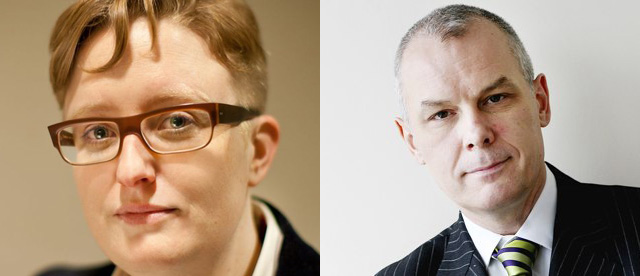On Saturday, Stonewall, the UK’s largest LGB charity, made its first steps towards redressing its long-standing exclusion of the trans community by hosting a conference attended by around 50 transgender activists and community members. Participants discussed what trans inclusion could or should look like as the start of a three-month consultation period around trans issues, which will culminate in a preliminary report in January 2015 and decisions on how to move forward from April 2015.
Fox Fisher (@SaluteHQ), co-director of My Genderation, produced a video summary of the day’s events featuring interviews with participants:
Stonewall Chief Executive Ruth Hunt began the meeting by acknowledging the harm Stonewall in England and Wales has inflicted upon or has otherwise been complicit in causing to trans people, including honouring TERF journalist Julie Bindel, using a transphobic slur in their anti-homophobia film Fit and collaborating with Paddy Power, which recently ran a transmisogynistic ad. (The group’s northern counterpart, Stonewall Scotland, already includes trans people in its activism and research.) She added that she believes the consultation process should not be guided by cis people.
According to detailed accounts by Jane Fae (@JaneFae, Gay Star News) and many others as collected by UK Trans Info, participants discussed three possible ways in which Stonewall could work with trans people:
- Stonewall becomes a full LGBT organisation
- Stonewall helps set up a sibling (linked but autonomous) organisation led by trans activists, providing it with initial resources and training
- Stonewall remains an exclusively LGB charity but provides grants to existing trans organisations
Most rejected option 3, favouring instead the possibility of combining the best of options 1 and 2: allowing trans activists full access to the resources and lobbying power of the country’s most successful and visible LGB rights group to date while also ensuring autonomy and equal participation. The objective of the conference was not to come to any conclusive decisions; instead, participants outlined their visions and flagged areas of concern, including the need to recognise the heterogeneity of trans people and narratives as well as safeguards to ensure trans inclusion in Stonewall isn’t merely contingent on the beliefs of whoever happens to be in charge at any one point in time.

Unlike his successor Ruth Hunt (left), who took the reins earlier this year, previous Stonewall CEO Ben Summerskill (right) did not believe the interests of trans people fell under the remit of the charity.
via The Mirror / The Guardian
Prior to the meeting, Ruth Pearce (@NotRightRuth, Writings of a Trans Activist) highlighted some of the specific concerns trans people in the UK face, including access to healthcare resources (transition-related or otherwise), the impacts of austerity, and lack of important localised data. Trans activists, she notes, severely lack funding, resources and knowledge to do research and lobbying work at a level comparable to Stonewall.
Participants were generally optimistic about the outcomes of the conference.
CN Lester (@cnlester, a gentleman and a scholar) and Kat Gupta (@mixosaurus, mixosaurus) raised the issue of the lack of diversity of the participants in terms of race, class, age, ability and so on — a concern the latter brought up even before the conference happened given its closed door, invitation-only status — as well as the lack of intersex participants and information on accessibility provisions. Far from being exclusive to trans organising, however, these problems are endemic in LGBT activism in the UK. While Stonewall stressed that this meeting was the first of many and that it remains open to all feedback from trans people, the demographic make-up of its first conference belabours the point that intersectionality requires proactive effort, not simply lip service: it’s not enough to expect marginalised people to participate in open calls; organisations need to seek them out and consciously create welcoming spaces for them.
There are further concerns about Stonewall’s broader politics and actions, which include honouring the Home Office as a Top 100 LGBT-Friendly Employer despite them routinely deporting LGBTQI asylum seekers and hosting champagne gala fundraisers that are a far cry from the material realities of most queer people in the country. Yet this too is an issue that extends beyond trans activism and illustrates how there is no single vision for trans involvement in Stonewall: while some may have very good reasons to continue to distance themselves from the charity, others like Paris Lees make the case that “trans people need Stonewall, and they need us too.”
Stonewall now wants to hear from everyone who has a view on its future engagement with trans issues and people, whether positive or negative. They’ve committed to holding more group meetings, particularly with underrepresented groups within the trans community, and are willing to host one-on-one conversations with those who’d be most comfortable with this arrangement. E-mail [email protected], fill in the feedback form on their website or call 08000 50 20 20 to participate in the consultation process.



Thanks for covering this!
You guys just are great.
Good points on disability- and accessibility, need more of that included.
So glad you covered this! Cautiously optimistic about what this could mean for Stonewall and other traditionally LG and LGB mainstream advocacy groups.
the internet will explode with so many trans awesomeness in one photo!